Flying high: How to get an upgrade
We all love the idea of getting something for nothing but the chances of getting a free flight upgrade these days are slimmer than Kate Middleton’s waist. Fluttering your eyelashes or flashing a Bond-like smile at check-in just won’t cut it. But it’s not impossible to work your way up from crushed cattle class to something a little cushier, especially if you know how to work the system.
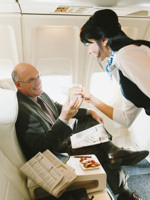 Solo travellers stand a better chance of an upgrade
Solo travellers stand a better chance of an upgradeDigital Vision / Thinkstock
Airlines always overbook so you may be asked at check-in if you’re willing to be bumped to another flight, and be offered cash for your trouble. If you accept the alternative flight, now is a good time to politely ask if you could possibly be upgraded as well, which sometimes works. If you don’t want to change flights however, ask if there’s any chance of an upgrade on the current flight instead.
This did the trick for Sue Jones, an office manager on her way back from vacation: “They offered me a different flight but I told them I just had to be on the one I’d booked to make a business meeting next day and they bumped me from economy to first class, which was brilliant!”
Sue’s case is rare however. I tried it once on my way to the Cannes Film Festival, having turned down the airline’s offer of around £300 compensation to fly next day. No luck. They managed to squeeze me onboard in my booked economy seat.
As with everything else, it’s often about who and not what you know and networking at 30,000 feet is no exception. If you have a family member or friend or even a friend of a friend who works for the airline, it can be worth its weight in gold so butter up those contacts.
You can also become ‘friends’ with your favourite airline. In fact, frequent flyer programmes are among your best chances of getting an upgrade, especially at check-in. Frequent flyer Richard Ellis, who’s had some success, said: “Show your frequent flyer card at check-in and politely ask if they are upgrading passengers that day. Offer to pay. Go to the business class queue. Explain that you’d like to get some work done and ask if there’s a waiting list you can go on. It helps if you are carrying a laptop.”
At the booking stage, you can often trade your reward points for a cabin upgrade – this feels like it’s free, even though it isn’t really.
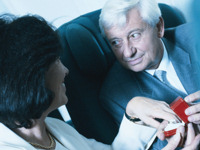 Celebrants are often more likely candidates
Celebrants are often more likely candidatesValueline / Thinkstock
Honeymooners, pregnant women, birthday celebrants are all more likely to get an upgrade if they are part of a frequent flyer programme. Having said that, some major airlines are notoriously stingy even with very loyal customers so it’s worth doing a bit of research before you commit to one airline.
Solo travellers stand the best chance of an upgrade, or couples willing to sit separately. Families with tons of kids, or groups, have less than a cat’s chance in hell.
Food flexibility also increases your chance of a move. Airline meal numbers are pretty rigid and special meal requests won’t travel with your upgrade, so fruitarians, vegans, and kosher diners are not as likely to get upgraded as omnivores. Just remember not to specify a special meal request when you book.
If you are going to get bumped up, looking the part doesn’t hurt. Bear in mind that no matter how big your Ray-Bans or your designer handbag; shorts and ripped jeans won’t wash unless you’re an internationally recognised celebrity.
Titles used to go some way towards getting an upgrade and if you’re a doctor, peer of the realm, judge or professor, it still doesn’t do any harm to list this when you book your ticket as airlines will often do a pre-flight trawl though the passenger list for suitable upgrade candidates, who would fit in with business or first-class passengers.
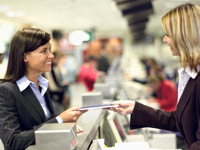 Being polite and smartly dressed can help
Being polite and smartly dressed can helpStockbyte / Thinkstock
Similarly, if you work for a non-profit organisation, are an executive for a Fortune 500 company, or are engaged in humanitarian work, list this on your OSI (other significant information) when you book.
If you’ve booked a premium economy seat you are far more likely to be upgraded than an economy passenger. That’s just how it goes when the airline looks at who is contributing most to their revenue stream.
Ticket types and codes are well worth getting to know as some tickets are never going to get you an upgrade. These are the discount, cheapest tickets, usually non-refundable. Tedious though it may be, find out what your ticket code means.
Each fare code comes with different restrictions and benefits and in general, the more you pay for your ticket, the greater the flexibility you’ll have. For example, if you see “Y-UP” on your economy ticket you are more likely to be able to get an upgrade as it’s the top price tier of economy.
If you’re willing to cough up a little cash, airlines often sell upgrades at check-in. They usually put up a notice stating they are available. It can be an absolute bargain as traveller Jo Price found: “My husband and I recently upgraded on Sri Lankan airlines. We paid £50 each at check-in to upgrade to Premium Economy which made a massive difference on a long haul flight.”
You’re most likely to get this kind of offer when you travel at weekends or off peak hours as that’s when there’ll be fewest business travellers around to fill those premium and business seats.
While not exactly an upgrade, extra legroom can be a boon if you snag one of those bulkhead seats with no-one in front of you. Exit row seats will also provide extra legroom. Some airlines will make a small charge, but it’s usually worth it, though bear in mind that other passengers often congregate in these areas to stretch their legs and chat during the flight. Check out the seat map on your airline’s website and choose your best option early, though bulkhead seats may be allocated at check-in only as airlines tend to keep these back for taller passengers, like frequent flyer Jo Price: “Being 5’ 11” tall often helps me get a seat with more legroom, especially in these days of DVT worries.”
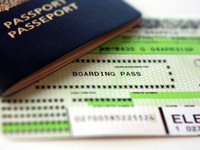 Knowing ticket types and codes is important
Knowing ticket types and codes is importantiStockphoto / Thinkstock
Remember aircraft design differs. An Airbus 380 can be roomier than a Boeing 747 but it depends on the airline to an extent as they can vary the pitch and width of seats, which makes all the difference when trying to cross your legs or fully unfold your laptop. Long-haul seat pitches in economy vary typically from 31” to 35”. All this information will be on your airline’s website.
Once on board, you may still get upgraded due to the nuisance factor. If your seat is broken or your TV screen won’t work, let your flight attendant know and you could get moved. You won’t necessarily get an upgrade but depending on the severity of the nuisance and the cabin capacity, you just might strike it lucky.
My 84-year-old mum was on a transatlantic flight next to a massive woman whose body fat was so fluid it was spilling over onto mum’s tray table. The flight attendant whisked my delighted mum to business class. It doesn’t hurt to be a twinkly-eyed, cute little old lady, but for the rest of us, politeness goes a long way. You may feel ready to blow a gasket if the small child behind you is kicking hell out of your seat, but don’t transmit your anger to the flight attendant.
Flying these days is every bit as wearing for crew as it is for passengers. So even if you’re not having a nice day, pretend you are. Put the flight attendant in the role of problem solver rather than demand they do something. In my experience, this can get you everything from a glass of champagne even when you’re not entitled to one, to an extra meal, and yes, even that elusive upgrade.
Do you have any Feedback about this page?
© 2026 Columbus Travel Media Ltd. All rights reserved. No part of this site may be reproduced without our written permission, click here for information on Columbus Content Solutions.






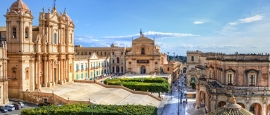


 You know where
You know where